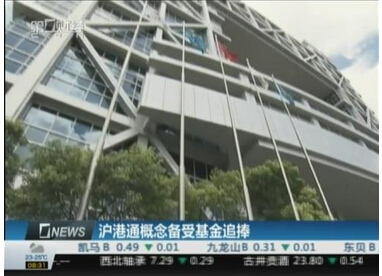(单词翻译:单击)
China’s trading rules pose a threat to the early success of the first direct access many foreigners will have to the country’s mainland stock markets, fund managers have warned.
基金经理们警告,中国的交易规则不利于境外投资者直接投资境内股市的渠道取得早期成功;这将是许多外国人首次拥有直接投资中国股市的渠道。
The Hong Kong-Shanghai Stock Connect is due to go live next month, allowing investors in each market to trade shares directly in the other. But fund managers say that a series of still unresolved issues could cause traditional long-only investors – exactly the kind of investor China wants to attract – to hold back from using the new system.
沪港通(Hong Kong-Shanghai Stock Connect)定于下月开通,使香港和上海股市的投资者能够直接交易对方股市的股票。但基金经理们表示,一系列尚未解决的问题可能导致只做长仓的传统投资者(正是中国希望吸引的那一类投资者)不敢使用新的系统。

Issues include legal ownership of Chinese A-shares, the requirements for delivering stock for sale and how China’s taxation regime will apply.
问题包括中国A股的法定所有权,交割卖出股票的要求,以及中国的税收制度将如何适用。
The opening of the link between the two exchanges has been hailed as an important, albeit small, step in the opening of China’s capital account. This is because it allows investors for the first time to buy Chinese securities under a general quota and without having to be approved individually by the authorities, as under the current qualified foreign institutional investor (QFII) scheme.
在两个交易所之间实现互联互通,被誉为向着开放中国资本账户迈出的重要的一小步。这是因为该制度首次允许境外投资者在一个总额度下买入中国证券,而无需得到主管部门的个别批准,就像现行的合格境外机构投资者(QFII)制度那样。
The assumption is that should the Stock Connect be a success, the initial quotas could be widened and more exchanges added. China also wants to encourage longer term investors to balance out its retail-heavy investor base. About 80 per cent of trading is done by small, individual investors who tend to follow market moods rather than investing based on fundamentals, which can exacerbate rallies and slumps.
人们的假设是,如果沪港通取得成功,最初的额度可能被拓宽,更多的交易所可能加入。中国还希望鼓励长线投资者,以平衡国内以散户为主的投资者基础。在中国境内股市,大约80%的交易是由小打小闹的个人投资者进行的,他们倾向于追随市场情绪,而不是根据基本面因素进行投资,这种格局可能加剧股市大起大落。
But long-only fund managers are warning they will have to hold off unless a string of issues are resolved. Testing of the technology has so far been successful but draft final rules are yet to be issued by either exchange.
但是,只做长仓的基金经理们警告,除非一系列问题得到解决,否则他们不会利用这一机制。技术测试迄今是成功的,但两地交易所都尚未公布最终规则的草案。
“All of us have been wanting a way to access China that wasn’t as convoluted as QFII but this isn’t quite it just yet. I’m sure that will change but there are a lot of teething issues,” said Emma Quinn, head of Asia-Pacific trading at AllianceBernstein.
“我们都希望得到一条投资中国的渠道,不像QFII那样复杂繁琐,但这个机制还不是很到位。我肯定局面会变化,但目前而言还存在不少初期的问题,”联博(AllianceBernstein)亚太交易主管艾玛•奎因(Emma Quinn)表示。
Under the system as outlined, any A-shares bought will be held in custody in a central depository run by the Hong Kong Exchange.
按照目前介绍的安排,在沪港通机制下,境外投资者买入的A股将由香港交易所(HKEx)运营的中央托管库托管。
But Chinese law does not recognise the owners beyond the HKEx custody pool – meaning that should the exchange collapse, those A-shares would in China be considered the HKEx’s property rather than that of the investor.
但是,中国法律不承认港交所托管库以外的所有者——这意味着如果港交所倒闭,这些A股在中国将被视为港交所(而非投资者)的财产。
“We need to be clearer about the legal standing investors have in China if the only owner China recognises is the HKEx,” said one senior trader.
“如果中国承认的唯一所有者是港交所,我们需要进一步明确投资者在中国具有的法律地位,”一位资深交易员表示。
Chinese rules banning naked short selling – selling shares without owning them first – are also causing problems. Meeting the rules means fund managers will have to deposit shares they wish to sell with their broker the day before and wait a day for payment, leaving them without control of their shares and out of pocket.
禁止裸卖空的中国规则(卖出自己并不拥有的股票)也引起问题。满足这些规则意味着,基金经理如果要卖出股票,就必须提前一日把这些股票存入他们的券商,然后等待一天拿到售股所得,这使他们在短期内失去对这些股票的控制,同时又拿不到款项。
Unlike other markets, China demands brokers have proof the shares exist before they can sell them.
与其他市场不同的是,中国要求券商首先得到股票存在的证据,然后才可以出售股票。


